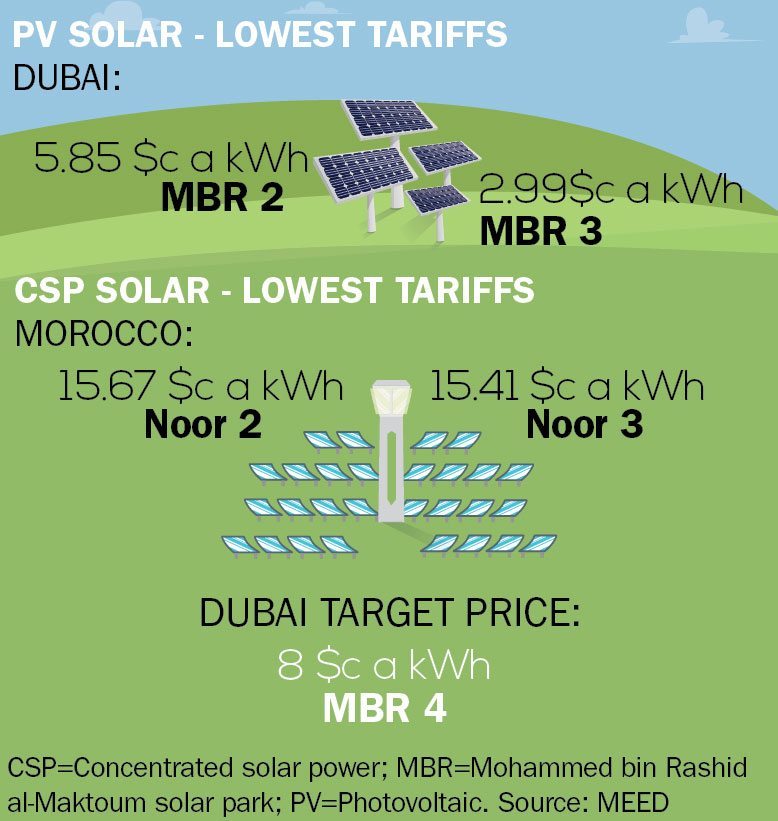

Countries are increasingly considering the use of concentrated solar power as part of their base-load energy mix and Dubais plans will see tariffs tumble
Photovoltaic (PV) technology has been the star of the solar industry over the past few years, grabbing headline after headline as tariff prices tumbled.
Dubai has managed to hold the world-record tariff price twice since the beginning of 2015, first for the 200MW phase two of the Mohammed bin Rashid al-Maktoum solar park and most recently for the 800MW phase three. In less than 18 months, the emirate has seen its levelised cost of electricity fall from 5.85 cents a kilowatt hour ($c/kWh) to 2.99$c/kWh.
Abu Dhabi will want to beat the price achieved by Dubai Electricity & Water Authority (Dewa) for its planned 350MW PV solar plant. And the sheer scale of Saudi Arabias recently revised renewables targets should enable the kingdom to achieve competitive tariffs for its programme. Dubai has shown that a stable country seen as a good investment environment can attract extremely competitive solar tariffs.

Lowest photovoltaic solar tariffs
There are many advantages to PV technology over concentrated solar power (CSP): its installation price is lower; it can be used in smaller physical spaces such as rooftops; installations can be small or large-scale; it does not rely on a grid connection for transmission and so can be off-grid; and it can generate power using both direct irradiance or diffuse radiation (CSP needs the former).
PV technology dominates the solar market. At the end of 2015, the technology accounted for 227GW of global capacity compared with 4.8GW for CSP.
Changing attitude
But there is a changing attitude towards CSP due to its storage capabilities, as countries in the region consider a future where they use fewer fossil fuels for electricity generation. While storage costs in PV systems will ultimately tumble, CSP, with its thermal storage capabilities, is seen as a strong alternative technology to provide sustainable, reliable baseload power generation capacity.
Morocco has been a leader in the region with its preference for CSP, despite stating that it is technology agnostic. At the recent MenaSol conference in Dubai, Mohamed Sahri, project manager for structuring at the Moroccan Agency for Solar Energy (Masen), said the country favours CSP because of its storage capabilities, which make it possible to deliver power at night.
Masen says its Noor 2 and 3 projects will have seven hours of storage each, and with todays battery technology, those levels would be more expensive to achieve using PV. The facilities will save more than 1 million tonnes of carbon dioxide emissions a year once in operation.
CSP provides reliable and optimised power, Sahri said, and that is the key point. As countries look to reduce their greenhouse gas emissions and either become energy independent or divert more of their finite fossil fuel resources to international markets, alternative baseload generating technologies are required within the energy mix.
And CSP is about to undergo a price revolution, thanks to Dubais plans for a 200MW CSP plant within the emirates solar park. Today the lowest CSP tariff in the region, at 15.67$c/kWh and 15.41$c/kWh, is for Moroccos Noor 2 and 3 installations being developed by Saudi Arabias Acwa Power.
Dewa CEO Saeed Mohammed al-Tayer has said he expects to achieve prices of 8$c/kWh or less. If reached and Dewas track record says this is likely it will be by far the lowest tariff price for CSP in the world.
The emirates plans will see it develop the worlds biggest CSP solar park running alongside its far larger PV array. By 2030, Dubai expects to be operating 1GW of CSP, with the solar parks total capacity expanded to 5GW. It will get 8-12 hours of thermal storage from its CSP facilities, providing a stable renewable energy source even at night, which will help reduce carbon dioxide emissions from power generation by about 6.5 million tonnes a year.
You might also like...

Abu Dhabi makes major construction investments
25 April 2024

Saudi Arabia seeks K9 PPP project interest
25 April 2024

Kuwait reviews 1.1GW solar prequalifications
25 April 2024

LIVE WEBINAR: Abu Dhabi Oil & Gas 2024
25 April 2024
A MEED Subscription...
Subscribe or upgrade your current MEED.com package to support your strategic planning with the MENA region’s best source of business information. Proceed to our online shop below to find out more about the features in each package.





